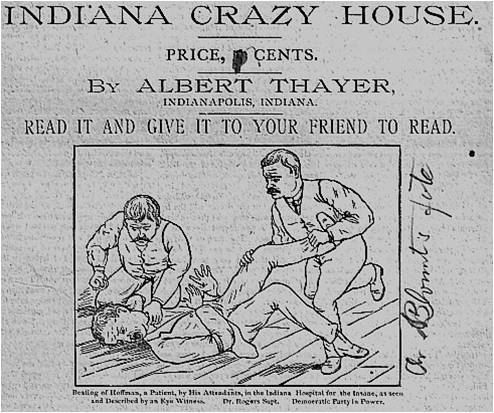Problems with Moral Treatment
Moral Treatment was a huge step in the right direction and a far cry from the asylum system that had previously dominated what we now call psychiatry. Unfortunately, the grand vision of what the hospital would be didn't turn out exactly as planned. The hospital did provide more humane treatment for the patients. It eased burdens on families. And it began a slow change in public perceptions about mental illness. But with almost a complete lack of understanding of the nature of the diseases they were trying to treat and few effective treatments for them, there just wasn't much that doctors could do.
 There is another layer of failure here that must be acknowledged. Almost from the beginning, allegations of abuse and neglect, nepotism, mismanagement and misuse of funds, and political cronyism were common-- and not unfounded. Many of the staff, including doctors, nurses, and attendants, were poorly paid, poorly trained, and poorly equipped emotionally to handle such high stress jobs. They were also spread too thin, as the hospital was constantly underfunded, overcrowded, and understaffed. All of this was frequently reflected in the level of care that patients received.
There is another layer of failure here that must be acknowledged. Almost from the beginning, allegations of abuse and neglect, nepotism, mismanagement and misuse of funds, and political cronyism were common-- and not unfounded. Many of the staff, including doctors, nurses, and attendants, were poorly paid, poorly trained, and poorly equipped emotionally to handle such high stress jobs. They were also spread too thin, as the hospital was constantly underfunded, overcrowded, and understaffed. All of this was frequently reflected in the level of care that patients received.
Many of the people admitted to the hospital had little real hope of a full recovery. Indiana Hospital for the Insane quickly filled up with patients, many of whom were not likely to go home any time soon. Beginning in the 1880s, as the need grew, hospitals like this one began opening across the State. They were funded by tax payers and expensive to build and operate. Many patients were admitted for long-term stays, and as one hospital filled up, a new hospital would be erected in response.
The image above is from "The Indiana Crazy House," a memoir published in the 1880s by a former patient named Albert Thayer. He first published it as a series of scathing editorials in the newspaper about his time at the Indiana Hospital for the Insane and the horrors he witnessed there.
Or Go Straight to the PATIENT STORIES